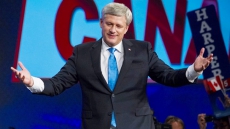OTTAWA — Prime Minister Justin Trudeau has unshackled his top diplomats.
Trudeau sent a letter Wednesday to the ambassadors and high commissioners of Canada's foreign missions telling them he and his cabinet will be relying on their judgment and insight to advance Canada's foreign policy goals.
The letter, a copy of which was obtained by The Canadian Press, tells them that Wednesday marks a "new era" for Canada's international engagement, and they have a critical role to play.
The letter marks a reversal of the strict message control that the Harper Conservative government imposed on its most seasoned diplomats over much of the past decade.
That included having speeches vetted and meetings approved by Ottawa, as well as crafting detailed talking points for events taking place in foreign countries.
Senior diplomats, including the former High Commissioner to the United Kingdom, have been subjected to message event proposals by the Conservatives — detailed planning documents created in Ottawa that laid out details and key messages for speeches and public appearances.
Trudeau's letter doesn't specifically refer to the Conservative message control, but it opens with one very direct message of its own.
"Today begins a new era in Canadian international engagement," he writes.
"You are experienced, skilled professionals, and some of Canada's best assets internationally. Under my leadership, you will have a government that believes in you and will support you in your work around the world."
The message was well received by top ranking diplomats around the globe.
"It's a breath of fresh air and a completely new style — an inspiring expression of trust and confidence in us," one Canadian ambassador told The Canadian Press on the condition they or their country not be named.
Trudeau goes on to say that, as "a Head of Mission, you are on the front lines of our diplomatic efforts," and he tells them they have a "critical role" to play in the advancement of Canadian foreign policy.
"I expect that you will be engaged energetically in public diplomacy with other diplomats, host government officials, civil society, and the media — in all manner of ways — through direct contact, the media, and social media," he writes.

"My cabinet colleagues and I will be relying on your judgment, insights, discretion, and work ethic in advancing our interests. I have every confidence that your reporting and our interactions when I am abroad will provide a critical, factual basis for our policies."
Trudeau also lays out his immediate and long-term foreign policy goals, and makes it clear he wants the diplomats to help him explain how Canada's "many strengths" ought to be shared with the world. He says Canada's international and domestic policies reinforce each other.
"International trade and investment promote growth and middle class jobs here in Canada, while environmental sustainability at home and abroad is vital to our economic future and well-being," the prime minister writes.
"Most immediately, I will be engaging with my counterparts in the coming weeks on such critical issues as climate change, international security, and the global economy. As a Canadian Head of Mission, you have a critical role in explaining Canada's renewed engagement on these issues.
"I know this cannot happen overnight."
Trudeau discusses his priorities for his upcoming international travel, which will include two major trips to four international summits in the coming weeks.
Trudeau will make his debut on the international stage in 10 days when he travels to the G20 leaders' summit in Turkey and goes on to the APEC summit in the Philippines.
Later in the month, he will attend the Commonwealth leaders' summit in Malta and then go on to Paris for what is widely seen as the main event in this opening round of travel: the international climate change conference in Paris.
Trudeau says he looks forward to "sharing a positive Canadian vision" with the world leaders he will meet at these summits and at later international events.
He says he will also follow through on his campaign promise to make Canada "an active and constructive member of the United Nations and other multilateral organizations."
The Harper government was openly critical of the UN calling it a forum for dictators, and criticizing it for being inefficient and wasteful.

Canada lost a bid for a temporary seat on the UN Security Council in 2010, the first such loss for the country in 70-year history of the organization.




